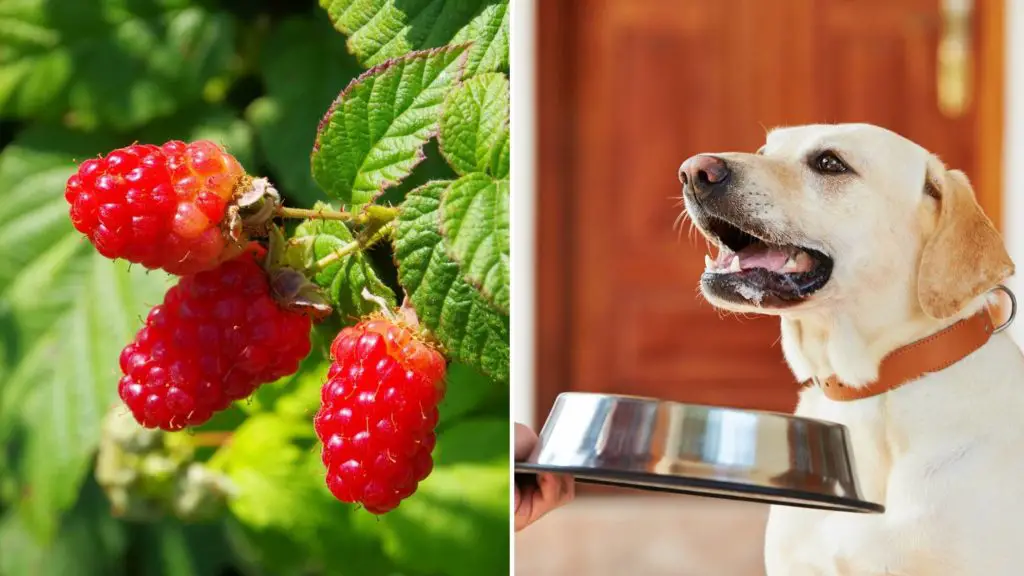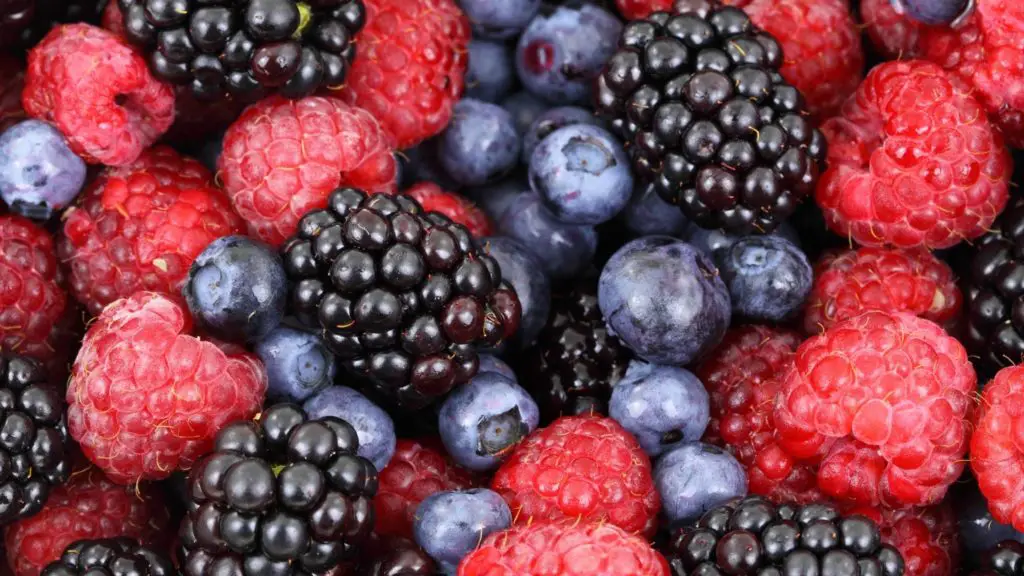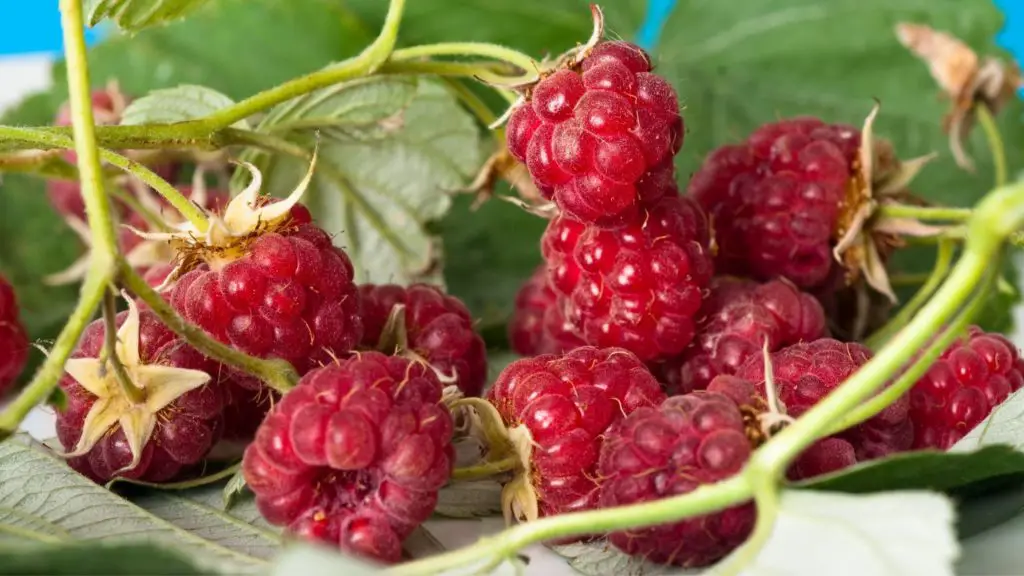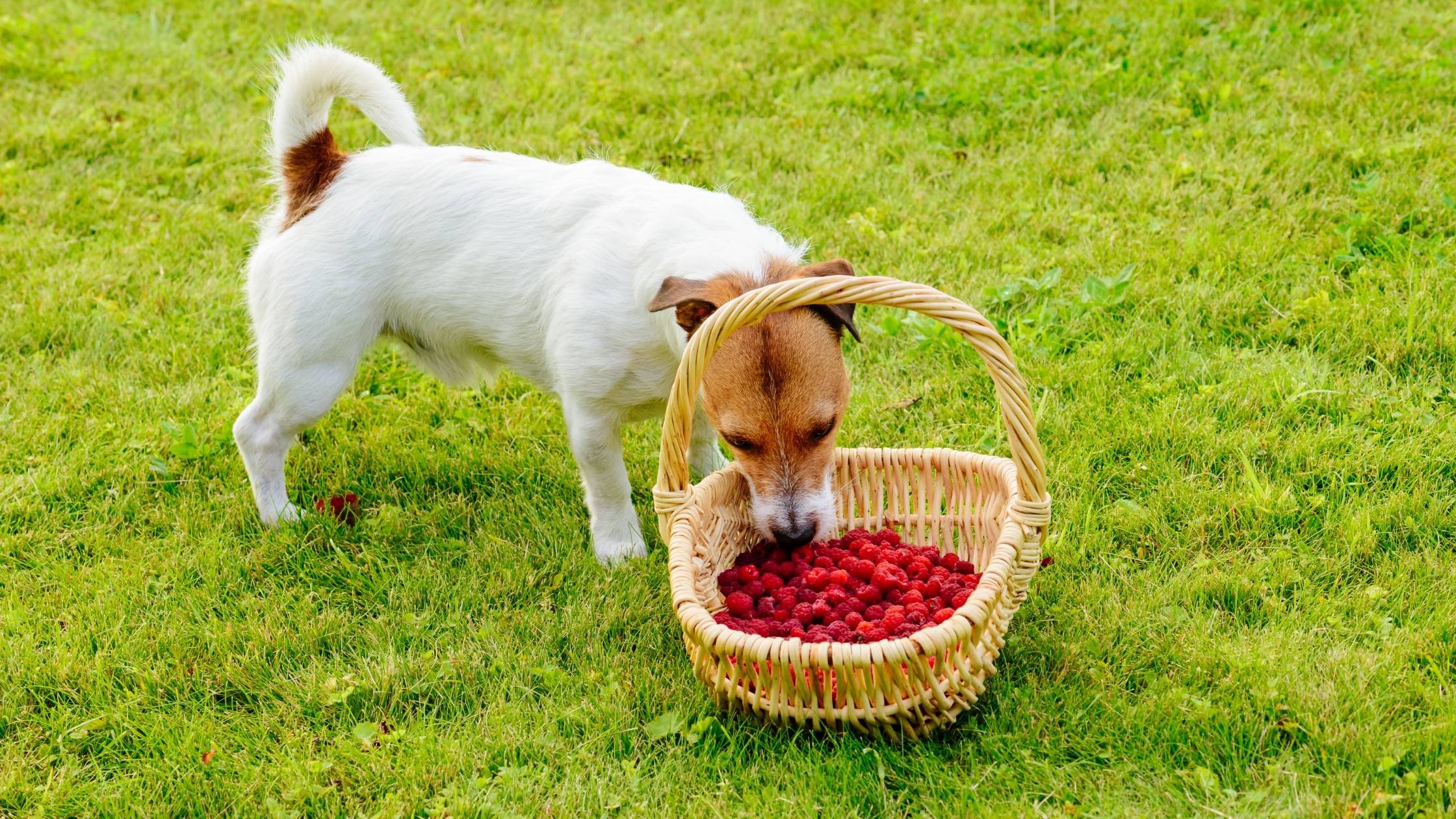Last Updated on 05/25/2021 by Veronica Jones
Dogs benefit from a variety of foods in their diets. Though a dog’s diet is mostly focused on protein, carbs and fats, they can also get a lot of useful nutrients from fruits and vegetables. Raspberries are obviously very popular with humans, but can dogs eat raspberries?
Here is a complete guide to help dog owners learn about the benefits, serving size, risks and more.
Can Dogs Eat Raspberries?
Yes, dogs can have raspberries. Raspberries are a nutritious, low-calorie fruit that is great as a snack for dogs. People can also add raspberries to their dog’s food. However, it should only be a treat for dogs because too many raspberries can cause low blood sugar levels in dogs.

What Are Raspberries?
Raspberries are a kind of edible fruit related to the rose family. Surprisingly, raspberries are not really berries because they are not true berries. A true berry, like blueberries, is a simple fruit that comes from a flower with one ovary, and it often has multiple seeds. Other examples of true berries are bananas, kiwis and pomegranates. People often say raspberries are berries because they look like true berries, but they are not true berries.
Raspberries are aggregate fruits, and they are in the same family as strawberries and blackberries. These fruits have more than one ovary. Raspberries have drupes on them, and each drupe has an ovary. Therefore, a raspberry cannot be a true berry.
What Happens if a Dog Eats Raspberries?
Raspberries in small amounts and as a treat will likely not do anything to most healthy dogs. Raspberries are healthy for most dogs, so usually, nothing will happen if a dog eats a handful of raspberries. In fact, they may get a small nutritional boost from eating raspberries. However, there is a risk that a dog develops hypoglycemia if they eat a lot of raspberries. In rare cases, too many raspberries can be life-threatening to dogs.

Are Raspberries Bad for Dogs?
Raspberries are a relatively healthy fruit snack for dogs. However, too much of anything can be bad. Raspberries are low-calorie and low in sugar, but having more than the recommended serving size can lead to issues. Some issues too many raspberries can cause include weight gain, diabetes, etc.
Recommended Article: Can Dogs Eat Grapes? Are they Safe?
Raspberries can have a negative impact on a dog’s digestive system if a dog eats too much of it. For instance, raspberries are a good source of fiber, but too much fiber can be dangerous. It can lead to side effects like constipation and vomiting.
Raspberries naturally contain xylitol. Xylitol is a natural sweetener found in veggies and fruits, and many people love it as a low-calorie sweetener. Xylitol is fine for most humans, but it can be very toxic to dogs. The pancreas releases insulin in humans and dogs to control blood sugar levels. Xylitol in raspberries does not trigger insulin release when humans eat it, but the natural sweetener may trigger too much insulin to get released from a dog’s pancreas.
The sudden amount of insulin released into the dog’s system can be very dangerous. It can cause a sudden and significant decrease in blood sugar levels. This can occur about 10-60 minutes after eating food with xylitol. It can be a life-threatening treatment if it does not get immediate treatment. Symptoms of xylitol poisoning in dogs include seizures, collapses, weakness, decreased activity, etc.
Luckily, a few raspberries on occasion will likely not result in poisoning in dogs. It takes a significantly large number of raspberries to be dangerous for their health. It took about 32 cups for a 22-pound dog to consume a fatal amount. However, that does not mean dogs can have a load of raspberries every day. 4-6 cups of raspberries can trigger low blood sugar levels. So, it should still be an occasional treat for dogs.

Are Raspberries Good for Dogs?
Yes, raspberries are good for dogs. There are so many benefits that raspberries can offer dogs. For one thing, they are low in calories and sugar. Therefore, it is a great snack to give to overweight dogs. Chubbier dogs can have a handful of raspberries as a treat to curb their hunger without gaining extra weight.
Raspberries also have a lot of dietary fiber. Fiber is important for dogs because it keeps the digestive system running smoothly. Therefore, it can prevent issues like constipation and diarrhea. Moreover, fiber is important for overweight dogs because it helps them feel full for a longer time.
Raspberries contain powerful antioxidants, like vitamin C, that can potentially reduce a dog’s risk for cancer, arthritis, diabetes and heart disease. Antioxidants target free radicals that harm the body’s tissue, which can prevent diseases and slow the aging process. Moreover, antioxidants like vitamin C can keep the immune system strong and reduce inflammation.
They also have vitamin K, which is important for healing. Vitamin K helps a dog’s blood clot when it gets wounded. Therefore, it can help wounds heal faster. Plus, raspberries have B-complex vitamins that create red blood cells and synthesize proteins.
Raspberries also have minerals like magnesium, iron, manganese, potassium and folic acid. Minerals are important for dogs because they help bones stay strong. They also help muscles contract and transmit nerve impulses. Plus, minerals help build soft tissue in the body.
Can Dogs Have Dried Raspberries?
Yes, dogs can have dried raspberries. However, the raspberries should not contain other additives like preservatives and sugar. These extra ingredients can be harmful to a dog. Additionally, dried raspberries are more concentrated than fresh or frozen ones. Therefore, dogs should have fewer dried raspberries.

What Kind of Raspberries Can Dogs Have?
Dogs can have fresh and organic raspberries. They can also have unsweetened frozen raspberries. However, dogs cannot have raspberries coated in syrup or sugar. Moreover, organic raspberries are better for dogs because they do not have any chemicals. Non-organic raspberries can contain pesticides that can build up in a dog’s stomach and cause negative effects.
Can Dogs Have Canned Raspberries?
No, dogs cannot have canned raspberries. Canned food usually contains many preservatives, which can be bad for dogs. Too many preservatives in a dog’s system can be toxic. Canned products often have a lot of sodium. Excess sodium in dogs can lead to extreme thirst, sodium ion poisoning, diarrhea, nausea, vomiting, etc/
Can Dogs Have Raspberry Jam?
No, dogs cannot have raspberry jam. Similar to canned foods, jams usually have preservatives to make them last longer, but these preservatives are not good for dogs. Additionally, raspberry jam usually has more sweeteners like sugar. Raspberries on their own are low in sugar, but raspberry jam usually has extra table sugar, sweetener, etc., which can take a toll on a dog’s health.
How Many Raspberries Can a Dog Have?
Large dogs can have about a cup of raspberries. Smaller dogs should have fewer raspberries, ranging from about 4-6 pieces. Medium dogs can have around half a cup of raspberries. Dogs can eat that amount every 1-2 weeks. Canine owners can cut that serving size to smaller portions and give their dogs raspberries throughout the week.
However, it is always important to introduce food to dogs slowly. Whether the dog is small or big, they should only try 1-2 raspberries for their first time. Pet owners can gradually increase that amount.

How to Feed a Dog Raspberries
Wash the raspberries underwater well to remove excess dirt. Larger dogs can eat raspberries whole. However, it may be best to halve the berries if the dog is small to prevent choking. Dogs can eat plain and clean raspberries. People may also sprinkle a few raspberries over their dog’s food for a nutrition boost.
Raspberries can be a fun and cool treat for dogs on a hot day. Pet owners can simply freeze raspberries or grab some already frozen strawberries then give them to their dogs. Given that these have no sugar or syrup, it is perfectly ok for dogs to eat. Pet owners can also add raspberries into a popsicle stick mold with other doggie-safe fruits and add water or salt-free chicken stock for an extra fun treat.
Can Puppies Eat Raspberries?
Ideally, puppies should only eat the food recommended for puppies, which includes their mother’s milk and puppy formula dog food. Puppies have very sensitive bodies compared to adult dogs. Raspberries only contain a little xylitol and are low in sugar, but the amount can be a lot to a small puppy. Therefore, puppies should wait until they are adults to try raspberries.
To Sum Up
Overall, raspberries are a fantastic treat for dogs to have. They are low in sugar and calories, which is great for overweight dogs. They are also full of vitamins and minerals that are a great boost to a dog’s health. However, dogs should not have too much to avoid digestive problems and poisoning.
References:
- Stanford Magazine, ‘Bananas Are Berries?’, https://stanfordmag.org/contents/bananas-are-berries, Date Accessed – 21 May, 2021
- Live Science, ‘Why are bananas berries, but strawberries aren’t?’, https://www.livescience.com/57477-why-are-bananas-considered-berries.html, Date Accessed – 21 May, 2021
- Medical News Today, ‘Xylitol: Uses, effects, and possible benefits’, https://www.medicalnewstoday.com/articles/324155, Date Accessed – 21 May, 2021
- Food and Drug Administration, ‘Paws Off Xylitol; It’s Dangerous for Dogs’, https://www.fda.gov/consumers/consumer-updates/paws-xylitol-its-dangerous-dogs, Date Accessed – 21 May, 2021

